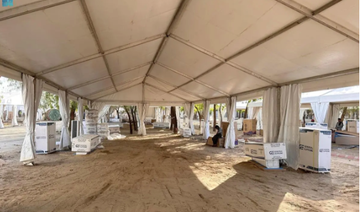COLOMBO: Departing for Saudi Arabia on Saturday, Abdul Hassan Mohammed Azwer is joining thousands of other Sri Lankans who have made it to the country’s Hajj contingent — often with sacrifices, as their country remains gripped by its worst financial crisis.
Muslims constitute about 10 percent of Sri Lanka’s 22 million population, which is predominantly Buddhist. This year, 3,500 of them will perform the spiritual journey that is one of Islam’s five pillars.
They have been boarding special flights to the Kingdom since last week, and many have used lifetime savings to afford the travel.
“So many sacrifices were made with the support of the family. Raising funds was extremely difficult,” Azwer told Arab News as he and his wife prepared for the journey.
“We do not have words to express our gratitude to the creator Almighty Allah for giving me and my wife the opportunity to visit the House of Allah, the Kaaba.”
While Sri Lanka, which last year defaulted on its foreign debt, is still gripped by the most severe downturn since independence in 1948, the situation is slowly improving, which is reflected by a higher number of pilgrims traveling to Saudi Arabia.
The 2022 Hajj season took place at the peak of the economic crisis, and only some 960 people could afford to meet their government’s requirement to pay in foreign currency to travel.
This year, too, while more people were able to go, they had to seek the help of others, usually relatives.
Ibrahim Sahib Ansar, who oversees Hajj logistics at the Ministry of Religious Affairs, said even life savings were often insufficient for pilgrims after many months of enduring skyrocketing inflation.
“It is very difficult to commit a large amount of money for the purpose of Hajj pilgrimage, particularly during the financial crisis,” he told Arab News.
But the commitment to fulfill their religious obligation, Ansar added, made many people welcome “certain sacrifices to perform Hajj this year.”
For Mohammed Yahya Mohammed Muhular, a 72-year-old schoolteacher, the opportunity to perform the Hajj came after years of waiting.
“I had my savings for the pilgrimage, but a major part of the financing came from my son,” he said.
Next week, when Muhular and his wife see the Kaaba for the first time, he said they will offer “sincere prayers” for Sri Lanka’s financial crisis to finally end.
















